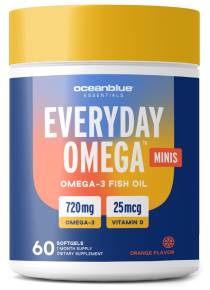Beauty in a Bottle? Nutrients That Improve Appearance

Well, of course nutrients can improve appearance, just as lack of crucial nutrients can detract from attractiveness.
Vitamin Deficiency Affects Beauty
I knew a lady in her 40s who was quite lovely, but she developed a severe liver disease that reduced her body’s ability to incorporate vitamins, meaning that even though she ate a healthy diet, her body wasn’t able to fully use that nutrition. This liver dysfunction led to avitaminosis, a condition resulting from deficiencies of one or more essential vitamins.
In only two months, her hair became thinner, drier, and less reflective of light. Her face was no longer soft and smooth, and the skin was coarse. Her skin color changed. Even her eyes lost their luster. She looked much older. I could not believe the dramatic change in her appearance in such a short period of time.
Fortunately, her disease was treatable with a liver transplant, and when her body was again able to properly utilize vitamins, her appearance once again changed dramatically—this time for the better!
This experience reinforced to me the powerful connection between optimum nutrition, including ample vitamins and minerals in their highest quality forms, and appearance.
Health Equals Beauty
Psychologists tell us that beauty, by definition, is a set of parameters that indicate youth, health, and fertility. And while cultures certainly influence certain aspects of beauty (tiny feet in historic China, fattening rituals in historic Tahiti, stretched earlobes amongst the Maasai of Africa, and facial tattoos amongst the Maori, to name only a few) there are also commonalities about indicators of health being perceived as quite attractive.
Most people agree that women with full, glossy hair, luminous skin, a brilliant smile, and a healthy weight fit the description of beauty. Humans also tend to prefer symmetrical features, and eyes that are a little bit larger in proportion to their face.
However, after years of exposure to Frankenfoods, toxins, ultraviolet (UV) radiation, and free radicals, damage may start to occur as dark circles under the eyes, uneven skin tones, dull complexion, and even inflammation and redness. The aging process itself results in thinner skin and collagen depletion, which contributes to a decrease in firmness.
Nutritional deficiencies, age, and hormonal changes can also decrease the quality and quantity of a woman’s hair. These are all areas that targeted nutritional supplementation can improve.
Vitamins & Supplements for Hair, Skin & Nails
Every vitamin is connected either directly or indirectly to some aspect of appearance. It is important to make sure you are getting ample amounts of these vitamins, especially the water-soluble B-family.
B Vitamins for Beauty
B vitamins occur in two forms, active and inactive. The inactive forms are converted to the active form, but as we age, and in the presence of certain diseases and even genetics, a lot of people are not efficient converters of one or more of the B vitamins.
It’s important to select B vitamins in the active (sometimes called methylated) form. Vitamin B6 is especially important to healthy skin and hair, so make sure you consider pyridoxal-5-phosphate, or the P-5-P form of B6 for most consistent results.
Biotin for Strength in Hair & Nails
Biotin is a vitamin-like compound that can make a measurable difference in hair quality and nail strength. Dosage is important. Many integrative practitioners recommend up to 5,000 micrograms (mcg) a day to see significant results.
Fight Free Radicals with Vitamin C
Vitamin C helps protect the skin from damage by UV radiation. It does not prevent the exposure but rather helps quench the free radicals created by the exposure. In a German clinical study, using vitamin C daily for four weeks was shown to increase the free radical-scavenging activity of the skin by 22 percent. Results of the study showed that the vitamin C went to work rapidly, and the benefits increased with higher doses of vitamin C.
Protect Skin From Premature Aging with French Grape Seed
French grape seed extract contains compounds called oligomeric proanthocyanins (OPC). OPCs are super-potent antioxidants and have other beauty-specific benefits as well. Research has shown that grape seed has the ability to reduce inflammation and protect the skin from premature aging.
Scientific studies have shown that grape seed extract has the ability to bond with collagen, allowing it to promote youthful skin and elasticity.
One issue with grape seed extract is that it contains OPCs in a variety of sizes. The largest are called tannins. If the OPCs are not absorbed, there are not benefits. Consider using products that are tannin free for the best results.
Curcumin & Boswellia For Reducing Skin Inflammation & Redness
I often refer to curcumin and boswellia as a dynamic duo, because they are so perfectly partnered for fighting inflammation. While this combo is well known for its ability to relieve pain, it is also useful for reducing skin redness and inflammatory skin disorders.
A form of clinically studied curcumin with turmeric essential oil containing turmerones has been shown to dramatically improve inflammatory factors that play a role in skin radiance.
Curcumin also improves collagen deposition and vascular density, especially in wounds and injuries. This is important, because vascular density ensures adequate blood flow to transport the nutrients needed for repair of damaged tissue. Additionally, curcumin has shown promise at reducing skin conditions such as psoriasis, eczema, and even skin cancer.
Curcumin is a generalist that addresses all types of inflammatory pathways, but boswellia is a specialist that has powerful effects on a very hard-to-treat type of inflammation called 5-lipoxegenase, or 5-LOX. This type of inflammation does not respond to typical drugs for inflammation, such as ibuprofen, aspirin, naproxen sodium, Celebrex, or Voltaren.
There is a high level of 5-LOX inflammation in certain skin issues, such as sclerotic skin lesions and there is research into the role of this enzyme system for atopic dermatitis.
Create Collagen with Silica
I can’t stress enough the importance of silica for healthy hair, skin and nails. Silica is critical to collagen creation, and our hair, skin, and nails are some of the highest collagen-containing parts of our body.
Reduction in collagen results in brittle, slow growing nails, poor hair quality, and sagging skin. Increasing intake of the mineral silica can increase collagen production with excellent results. It may even lessen acne breakouts.
The majority of silica products are in one of 3 forms: mineral (from rocks) silica, plant-based silica (mostly form a plant called horsetail), and the synthetic orthosilicic acid. The plant form has excellent benefits, but make sure that it is purified to remove some of the harsh crystals found in the plant. The synthetic form is also clinically studied for both hair and skin.
Take Care of Your Hair with Millet Seed Oil
While you may have heard of the ancient grain millet, you’ve likely never heard of millet seed (Panicum miliaceum) oil. Millet seed oil contains a compound called millacin which has been shown in some preliminary studies to have extraordinary benefits. It has even been investigated for hair loss associated with chemotherapy.
In a case-controlled study, 28 cancer patients were treated with millet seed oil throughout chemotherapy treatment and 56 cancer patients did not use millet seed oil. The grade of hair loss was assessed by World Health Organization (WHO) criteria. They found that the percentage of hair loss observed in patients treated with millet seed oil in association with chemotherapy was significantly lower than that found in those who received the chemotherapy only.
Support Your Hair Growth with Omega 3 & Omega 7
Omega 3 fatty acids from cold-water fish have been shown to support hair growth and thickness, as well as reduce dry skin. They are also anti-inflammatory.
There is another omega fatty acid found in macadamia nuts and sea buckthorn berries called omega 7. This rare omega is incorporated into cell walls and is good at holding on to water. If the cells are better hydrated, skin appearance is enhanced. Luminosity is a measure of skin reflectivity, which is enhanced by the use of omega 7s.
In a study of skin aging, 60 women over the age of 50 were evaluated for skin hydration, elasticity, roughness. Luminosity and skin thickness/firmness before and after using an oral sea buckthorn oil capsule for 3 months. At the end of the study, there were significant improvements in hydration, elasticity, roughness, and fine wrinkles. The authors note that the supplementation “reduced the signs of skin aging.”
The most clinically studied sea buckthorn extract in the world is a proprietary blend of seed and fruit pulp oil, which yields a wider spectrum of nutrients from the berry.
Nutrients for Beauty
There are certainly clinically demonstrated nutrients that can make a significant difference in appearance, including those parameters we identify as “beauty.” There is no one beauty nutrient; rather, an array of beneficial herbs, vitamins, and oils each address different aspects of hair, skin, and nail health. Putting together a protocol of effective products can result in visible differences.
“Association of vitamin B-6 status with inflammation, oxidative stress, and chronic inflammatory conditions: The Boston Puerto Rican Health Study” by J. Shen et al., Am J Clin Nutr, 2/10
“Biotin and biotinidase deficiency” by J. Zempleni et al., Expert Rev Endocrinol Metab, 11/1/08
“Brittle nails: response to daily biotin supplementation” by L.G. Hochman et al., Cutis, 4/93
“A case-control study of Panicum miliaceum in the treatment of cancer chemotherapy-induced alopecia” by G. Gardani et al. Minerva Medi, 12/07
“Dietary silicon intake and absorption” R. Jugdaohsingh et al.. Am J Clin Nutr, 2002
“Effect of oral intake of choline-stabilized orthosilicic acid on hair tensile strength and morphology in women with fine hair” by R.R. Wickett et al., Arch Dermatol Res, 12/07
“Human skin condition and its associations with nutrient concentrations in serum and diet” by E. Boelsma et al., Am J Clin Nutr, 2003
“Effect of zinc deficiency on blood glutathione levels” by B.J. Mills et al., J Nutr, 6/81
“Effects of oral supplementation and topical application of supercritical CO2 extracted sea buckthorn oil on skin aging of female subjects” by B. Yang et al., J Appl Cosmetol, 1-3/09
“Inflammation causes tissue-specific depletion of vitamin B6” by E.P. Chiang et al., Arthritis Res Ther, 2005
“Innate immunity: A crucial target for zinc in the treatment of inflammatory dermatosis” by A. Brocard et al., J Eur Acad Dermatol Venereol, 1/24/11
“Mackerel-derived fermented fish oil promotes hair growth...” by J.I. Kang et al., Int J Mol Sci, 9/14/18
“Nutritional skin care: Health effects of micronutrients and fatty acids” by E. Boelsma et al., Am J Clin Nutr, 2001
“Oral supplementation with fish oil reduces dryness and pruritus...” by R.C. Barcelos et al., J Dermatol Sci, 9/15
“The role of lipoxygenases in pathophysiology; new insights and future perspectives” by R. Mashima and T. Okuyama, Redox Biol, 12/15
“Treatment of brittle fingernails and onychoschizia with biotin: scanning electron microscopy” by V.E. Colombo et al., J Am Acad Dermatol, 1990
“Xenobiotics in vitro: The influence of L-cystine, pantothenat, and miliacin on metabolic and proliferative capacity of keratinocytes” by D.H. Obrigkeit et al., Cutan Ocul Toxicol, 2006
“Zinc deficiency and the prolonged accumulation of zinc in wounds” by A. Senapati, Br J Surg, 7/85
Cheryl Myers
Cheryl Myers, RN, is an integrative health nurse, author, and expert on natural medicine. She is a nationally recognized speaker who has been interviewed by the New York Times, Wall Street Journal and Prevention magazine. Her articles have been published in Aesthetic Surgery Journal and Nutrition in Complementary Care, and her research on botanicals has been presented at the American College of Obstetrics and Gynecology and the North American Menopause Society. Follow Cheryl on Facebook!
Don't Miss a Thing!
Get the latest articles, recipes, and more, when you sign up for the tasteforlife.com newsletter.

